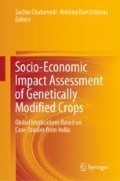Abstract
The most important challenge in Socio-Economic Assessment (SEA) lies in developing suitable frameworks and guidelines that can be implemented. As many factors and values have to be considered in any such assessment, inevitably issues on methodologies and approaches have to be addressed. Since SE Assessment goes beyond traditional economic assessment including Cost–Benefit Analysis, any discussion on SEA will also be a discussion on alternative frameworks, methodologies and bringing together economic factors and non-economic factors. This chapter discusses the approaches explained in the literature to estimate the various impacts and what costs and factors are considered in different methodologies.
Access this chapter
Tax calculation will be finalised at checkout
Purchases are for personal use only
Notes
- 1.
- 2.
On SLOs see van Putten et al. (2018).
- 3.
See Sanchez et al. (2016) for an example of such an analysis.
- 4.
In fact there are not many studies that look into gender dimension in adoption of LMOs. A much cited study (Subramanian et al. 2010) shows that cultivation of Bt crops has positive impacts on women’s employment.’
References
Brnjaš, Z., Ćurčić, M., & Stošić, I. (2015). Assessment of the socio-economic impact of the chemicals environmental contamination. Faculty of Business Economics and Entrepreneurship, International Review (2015, No. 1–2).
Brookes., G., & Barfoot, P. (2015). Environmental impacts of genetically modified (GM) crop use 1996–2013: Impacts on pesticide use and carbon emissions. GM Crops & Food, 6, 103–133.
COGEM. (2014). Building blocks for an assessment framework for the cultivation of genetically-modified crops. COGEM Report CGM/141222-01. The Hague: COGEM.
Falck-Zepeda, J., Cohen, J., Meinzen-Dick, R., & Komen, J. (2002). Biotechnology and sustainable livelihoods—Findings and recommendations of an international consultation. Briefing Paper 54. The Hague: ISNAR.
FAO. (2009). Assessing the socio-economic impacts of non-transgenic biotechnologies in developing countries. Rome: FAO.
Ludlow, K., Smyth, S. J., & Falck-Zepeda, J. (Eds.). (2014). Socio-economic considerations in biotechnology regulation. New York: Springer.
Meinzen-Dick, R. S. (2001). Measuring the livelihood impact of agricultural research. Paper presented at the ISNAR consultation “Biotechnology and Rural Livelihood— Enhancing the Benefits”, held in June 2001, The Hague.
NAS. (2016). Genetically engineered crops: Experiences and prospects. Washington D.C.: NAS.
Rutz, D., & Janssen (Eds.). (2014). Socio-economic impacts of bioenergy production. Heidelberg: Springer.
Sanchez, M. A., et al. (2016). Outcrossing potential between 11 important genetically modified crops and the Chilean vascular flora. Plant Biotechnology Journal, 14, 625–637.
Subramanian, A., Kirwan, K., Pink, D., & Qaim, M. (2010). GM crops and gender issues. Nature Biotechnology, 28, 404–406.
UNEP. (2017). Guidance on socio-economic assessment for national implementation plan development and implementation under the Stockholm Convention Nairobi: UNEP. http://chm.pops.int/Implementation/NationalImplementationPlans/Guidance/tabid/7730/ctl/Download/mid/20995/Default.aspx?id=1&ObjID=25543. Last accessed 1 July 2019.
van Putten, I., Cvitanovic, C., Fulton, B., Lacey, J., & Kelly, R. (2018). The emergence of social licence necessitates reforms in environmental regulation. Ecology and Society, 23(3), 1–24.
Author information
Authors and Affiliations
Corresponding author
Editor information
Editors and Affiliations
Rights and permissions
Copyright information
© 2019 Springer Nature Singapore Pte Ltd.
About this chapter
Cite this chapter
Chaturvedi, S., Srinivas, K.R., Kumar, A. (2019). Frameworks and Guidelines for Socio-economic Assessment. In: Chaturvedi, S., Srinivas, K. (eds) Socio-Economic Impact Assessment of Genetically Modified Crops. Springer, Singapore. https://doi.org/10.1007/978-981-32-9511-7_11
Download citation
DOI: https://doi.org/10.1007/978-981-32-9511-7_11
Published:
Publisher Name: Springer, Singapore
Print ISBN: 978-981-32-9510-0
Online ISBN: 978-981-32-9511-7
eBook Packages: Economics and FinanceEconomics and Finance (R0)

